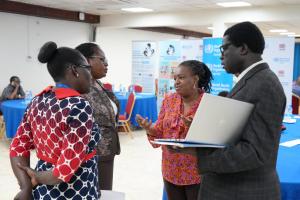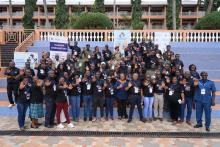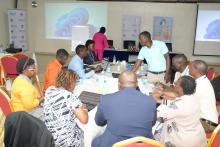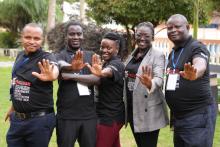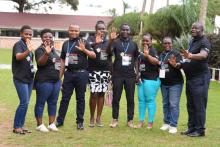Uganda strengthens emergency response capacity to prevent and respond to sexual exploitation, abuse, and harassment
With support from the Foreign, Commonwealth and Development Office (FCDO), World Health Organization (WHO) collaborated with the Government of Uganda to train 78 multidisciplinary emergency responders under the AVoHC-SURGE, a joint initiative between Africa CDC's African Volunteer Health Corps (AVoHC) and WHO's Strengthening and Utilizing Response Groups for Emergencies (SURGE) program.
The training aimed to build a skilled and coordinated workforce capable of rapid deployment during health emergencies. A key component of the training focused on prevention and response to sexual exploitation, abuse, and harassment (PRSEAH).
During emergencies, the risk of sexual exploitation, abuse, and harassment (SEAH) increases due to heightened vulnerabilities caused by gender inequalities, power imbalances, and poverty. These risks are further exacerbated by the chaos and stress within households, communities, and society at large. Sexual misconduct not only causes deep harm to individuals and communities but also undermines the credibility and integrity of response efforts led by state actors, WHO, and partner organizations.
WHO maintains a strict policy of zero tolerance for sexual misconduct and, in line with its Emergency Response Framework, one of the core mandates for all emergency responders is to embed prevention and response to sexual exploitation, abuse and harassment in all emergency response operations.
“It is such a catastrophe when we failure to protect the people we serve and those with whom we serve against sexual misconduct. This training equips emergency responders with the capacity to prevent and respond to any form of sexual misconduct in their areas of deployment,” said Dr Kasonde Mwinga, WHO Representative to Uganda.
With technical support from the PRSEAH in emergencies technical officer at the WHO African regional office, the inter-agency protection from sexual exploitation and abuse (PSEA) network, the WHO Uganda PRSEAH committee conducted elaborative sessions on key SEAH concepts, community-based feedback mechanisms, reporting channels, referral pathways and survivor assistance protocols.
“I now understand the subject better. Before this training, I thought it was just a campaign against sex. I gained critical knowledge in prevention and response strategies to safeguard communities and fellow responders against sexual misconduct,” said Joshua Kayiwa, a participant from the Ministry of Health’s Emergency Operations Centre.
Other participants echoed similar sentiments, emphasizing how WHO’s elaborate training enhances institutional capacity and strengthens cross-sectoral strategies to prevent and respond to sexual misconduct, especially during public health emergencies.
As Uganda continues to build a resilient health emergency workforce, integrating PRSEAH principles ensures that response efforts are not only effective but also ethical and inclusive -protecting both the communities served and those who serve them. By equipping emergency responders with the knowledge and tools to prevent and address sexual exploitation, abuse, and harassment, WHO and its partners are reinforcing a culture of accountability, protection, and respect.



